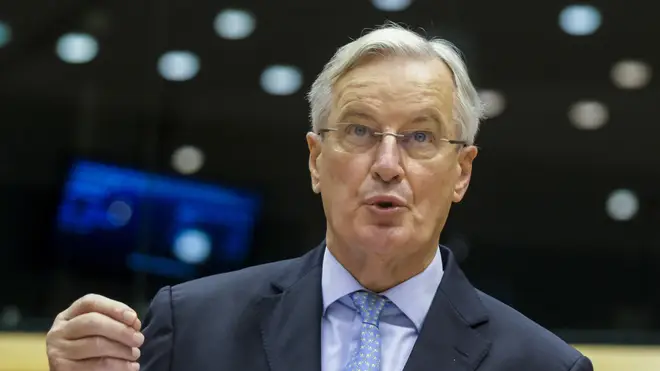
Clive Bull 1am - 4am
21 October 2020, 17:18 | Updated: 21 October 2020, 20:04

Downing Street will reopen trade talks with the EU this week, just days after negotiations stalled sparking fears the UK would crash out of the bloc without a deal.
No 10 said the EU's chief negotiator Michel Barnier and his British counterpart Lord Frost had agreed on a set of principles for an "intensified phase of talks" starting on Thursday.
However, Downing Street acknowledged that "significant gaps" remain between the two sides and it was "entirely possible that negotiations will not succeed".
Boris Johnson previously issued his strongest indication yet that he had shelved plans for further negotiations after Lord Frost last week told Mr Barnier not to come to London for planned talks without a major change in position from EU leaders.
And on Friday the Prime Minister signalled the EU was unwilling to agree to a deal with the UK, accusing European leaders of having "abandoned the idea of a free trade deal".
Read more: German MEP says Boris Johnson has 'been lying to the UK' over Brexit
Read more: Government suffers major defeat in House of Lords over Brexit bill

German MEP's scathing attack on Boris Johnson over Brexit
But tonight, although Downing Street conceded that there needs to be "movement from both sides" for a deal to be struck, a team from the EU will now travel to London to resume negotiations this week.
The main stumbling blocks remain fishing rights, the governance of any deal and the "level playing field" aimed at preventing unfair competition, which includes state subsidies.
Time is short to reach an agreement before the end of the transition period on December 31.
Mr Barnier told the European Parliament: "Our door remains open. It will remain open right up until the last day when we can work together."
But he said "it takes two to make a deal", adding: "We are not sure that's the outcome we will obtain and that's why we need to be ready to deal with the consequences of a possible no-deal scenario."
On Wednesday, a No 10 spokesperson said: “We have studied carefully the statement by Michel Barnier to the European Parliament this morning. As the EU’s Chief Negotiator his words are authoritative.
Read more: Boris Johnson says UK should 'get ready' for no deal Brexit
Read more: MPs vote to 'take back control of UK waters' as Fisheries Bill clears Commons

Business Minister sets out the difference between an Australia-deal and a No-Deal Brexit.
“The Prime Minister and Michael Gove have both made clear in recent days that a fundamental change in approach was needed from the EU from that shown in recent weeks.
“They made clear that the EU had to be serious about talking intensively, on all issues, and bringing the negotiation to a conclusion. They were also clear that the EU had to accept once again that it was dealing with an independent and sovereign country and that any agreement would need to be consistent with that status.
“We welcome the fact that Mr Barnier acknowledged both points this morning, and additionally that movement would be needed from both sides in the talks if agreement was to be reached. As he made clear, ‘any future agreement will be made in respect of the decision-making autonomy of the European Union and with respect for British sovereignty.’
“Lord Frost discussed the implications of this statement and the state of play with Mr Barnier earlier today. On the basis of that conversation we are ready to welcome the EU team to London to resume negotiations later this week. We have jointly agreed a set of principles for handling this intensified phase of talks.

Brexit voter didn't know Australia and No-Deal 'were the same thing'
“As to the substance, we note that Mr Barnier set out the principles that the EU has brought to this negotiation, and that he also acknowledged the UK’s established red lines. It is clear that significant gaps remain between our positions in the most difficult areas, but we are ready, with the EU, to see if it is possible to bridge them in intensive talks. For our part, we remain clear that the best and most established means of regulating the relationship between two sovereign and autonomous parties is one based on a free trade agreement.
“As both sides have made clear, it takes two to reach an agreement. It is entirely possible that negotiations will not succeed. If so, the UK will end the transition period on Australia terms and will prosper in doing so.
“It is essential now that UK businesses, hauliers, and travellers prepare actively for the end of the transition period, since change is coming, whether an agreement is reached or not.”